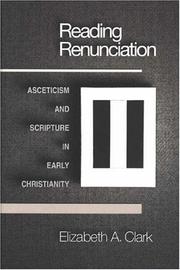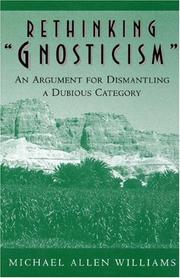| Listing 1 - 2 of 2 |
Sort by
|

ISBN: 0691005117 0691005125 1400823188 1282753770 9786612753770 1400811244 9781400823185 1400801230 9780691005126 1400801222 Year: 1999 Publisher: Princeton (N.J.): Princeton university press
Abstract | Keywords | Export | Availability | Bookmark
 Loading...
Loading...Choose an application
- Reference Manager
- EndNote
- RefWorks (Direct export to RefWorks)
A study of how asceticism was promoted through Biblical interpretation, Reading Renunciation uses contemporary literary theory to unravel the writing strategies of the early Christian authors. Not a general discussion of early Christian teachings on celibacy and marriage, the book is a close examination, in the author's words, of how "the Fathers' axiology of abstinence informed their interpretation of Scriptural texts and incited the production of ascetic meaning." Elizabeth Clark begins with a survey of scholarship concerning early Christian asceticism that is designed to orient the nonspecialist. Section Two is organized around potentially troubling issues posed by Old Testament texts that demanded skillful handling by ascetically inclined Christian exegetes. The third section, "Reading Paul," focuses on the hermeneutical problems raised by I Corinthians 7, and the Deutero-Pauline and Pastoral Epistles. Elizabeth Clark's remarkable work will be of interest to scholars of late antiquity, religion, literary theory, and history.
248 "00/04" --- Asceticism --- -Ascetical theology --- Contempt of the world --- Theology, Ascetical --- Christian life --- Ethics --- Spiritualiteit. Ascese. Mystiek. Vroomheid--?"00/04" --- History --- -Asceticism --- Bible --- Criticism, interpretation, etc. --- Biblia --- Asceticism - History - Early church, ca 30-600 --- Acts of Paul and Thecla. --- Acts of Thomas. --- Adultery. --- Allegory. --- Ambrosiaster. --- Anchorite. --- Apologetics. --- Apostasy. --- Arianism. --- Asceticism. --- Basil of Ancyra. --- Basil of Caesarea. --- Bible. --- Body of Christ. --- Book of Judges. --- Book of Wisdom. --- Celibacy. --- Chastity. --- Christian Order. --- Christianity. --- Church Fathers. --- Clement of Alexandria. --- Clerical celibacy. --- Concupiscence. --- Consummation. --- Contra Celsum. --- Conversion to Christianity. --- Criticism of marriage. --- De fide. --- Dialogue with Trypho. --- Dispensation (canon law). --- Docetism. --- Donatism. --- Elijah. --- Epistle to the Ephesians. --- Evagrius Ponticus. --- Exegesis. --- Ezekiel. --- Fear of God. --- First Epistle to the Corinthians. --- Fornication. --- Gluttony. --- God. --- Helvidius. --- Heresy. --- Heterodoxy. --- Holiness code. --- Idolatry. --- Incest. --- Incorruptibility. --- Indulgence. --- Infidel. --- Jews. --- John Cassian. --- John Chrysostom. --- Jovinian. --- Judaizers. --- Justification (theology). --- Justin Martyr. --- Lactantius. --- Manichaeism. --- Marcion of Sinope. --- Marcionism. --- Matthew 25. --- Melania the Elder. --- Midrash. --- Monasticism. --- Montanism. --- New Testament. --- Old Testament. --- Origen. --- Paganism. --- Parable of the Great Banquet. --- Parable of the Ten Virgins. --- Paulinus of Nola. --- Pelagianism. --- Progressive revelation (Bahá'í). --- Rebuke. --- Religion. --- Religious text. --- Renunciation. --- Rule of Faith. --- Sacramentum (oath). --- Self-denial. --- Sexual Desire (book). --- Sexual abstinence. --- Sirach. --- Sola fide. --- Spiritual marriage. --- Spirituality. --- Spouse. --- Superiority (short story). --- Susanna (Book of Daniel). --- Tertullian. --- The City of God (book). --- Theodore of Mopsuestia. --- Theology. --- Thomas the Apostle. --- Thou shalt not commit adultery. --- Virginity.

ISBN: 0691005427 0691011273 1400822211 1282753193 9786612753190 1400813832 9781400822218 1400808537 9780691011271 Year: 1999 Publisher: Princeton, NJ
Abstract | Keywords | Export | Availability | Bookmark
 Loading...
Loading...Choose an application
- Reference Manager
- EndNote
- RefWorks (Direct export to RefWorks)
Most anyone interested in such topics as creation mythology, Jungian theory, or the idea of "secret teachings" in ancient Judaism and Christianity has found "gnosticism" compelling. Yet the term "gnosticism," which often connotes a single rebellious movement against the prevailing religions of late antiquity, gives the false impression of a monolithic religious phenomenon. Here Michael Williams challenges the validity of the widely invoked category of ancient "gnosticism" and the ways it has been described. Presenting such famous writings and movements as the Apocryphon of John and Valentinian Christianity, Williams uncovers the similarities and differences among some major traditions widely categorized as gnostic. He provides an eloquent, systematic argument for a more accurate way to discuss these interpretive approaches. The modern construct "gnosticism" is not justified by any ancient self-definition, and many of the most commonly cited religious features that supposedly define gnosticism phenomenologically turn out to be questionable. Exploring the sample sets of "gnostic" teachings, Williams refutes generalizations concerning asceticism and libertinism, attitudes toward the body and the created world, and alleged features of protest, parasitism, and elitism. He sketches a fresh model for understanding ancient innovations on more "mainstream" Judaism and Christianity, a model that is informed by modern research on dynamics in new religious movements and is freed from the false stereotypes from which the category "gnosticism" has been constructed.
Gnosticism. --- Rome --- Religion. --- Gnosticism --- 273.1 --- 273.1 Gnosis. Gnosticisme --- Gnosis. Gnosticisme --- Religion --- Cults --- Rome - Religion --- Against the Galilaeans. --- Agrippa Castor. --- Anchorite. --- Anthropomorphism. --- Anti-Judaism. --- Antinomianism. --- Antipope. --- Apocalypse. --- Apocrypha. --- Apocryphon. --- Apostasy. --- Asceticism. --- Blasphemy. --- Borborites. --- Cainites. --- Catharism. --- Celibacy. --- Cerdo (gnostic). --- Cerinthus. --- Christian Identity. --- Christian fundamentalism. --- Christianity. --- Church Fathers. --- Clement of Alexandria. --- Consubstantiality. --- Contra Celsum. --- Creation myth. --- Demiurge. --- Demonization. --- Dialogue with Trypho. --- Divine Spark. --- Doctrine. --- Elohim. --- Epiphanes (gnostic). --- Epistle to the Laodiceans. --- Ernst Troeltsch. --- Exegesis. --- Exorcism. --- False prophet. --- God. --- Good and evil. --- Gospel of Eve. --- Gospel of Philip. --- Heresy of the Free Spirit. --- Heresy. --- Heterodoxy. --- Holy Book of the Great Invisible Spirit. --- Ideal type. --- Incorruptibility. --- Infidel. --- Irenaeus. --- Jews. --- Judaism. --- Judas Iscariot. --- Justification (theology). --- Justin Martyr. --- Manichaeism. --- Marcion of Sinope. --- Marcionism. --- Martyr. --- Metempsychosis. --- New religious movement. --- Nicolaism. --- Orthodox Judaism. --- Plotinus. --- Predestination. --- Problem of evil. --- Pseudo-Philo. --- Puritans. --- Pythagoreanism. --- Reform Judaism. --- Religious text. --- Renunciation. --- Sacred prostitution. --- Satan. --- Sect. --- Secularization. --- Self-denial. --- Sethianism. --- Sexual Desire (book). --- Sexual abstinence. --- Simon Magus. --- Skepticism. --- Sophia (Gnosticism). --- Spiritual marriage. --- Spirituality. --- Superiority (short story). --- Tertullian. --- The Other Hand. --- Theodicy. --- Theodotus of Byzantium. --- Theology. --- Thou shalt not commit adultery. --- Thou shalt not covet. --- Tractate. --- Wickedness. --- Writing. --- Zostrianos.
| Listing 1 - 2 of 2 |
Sort by
|

 Search
Search Feedback
Feedback About UniCat
About UniCat  Help
Help News
News